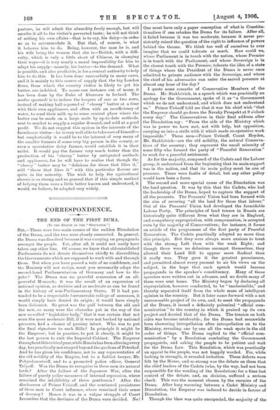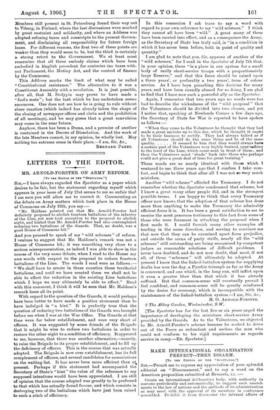CORRESPONDENCE.
THE END OF THE FIRST DIIMA.
LTO THE EDITOR OF THE "SPECTATOR."]
Srn,—There were two main causes of the sudden Dissolution of the Duma, and the two were closely connected. In general, the Durna was dissolved because it was carrying on propaganda amongst the people. Yet, after all, it could not easily have taken any other line. Of course, we know that old-established Parliaments do not devote themselves chiefly to discrediting the Governments which are supposed to work with and through them. But when you have passed a vote of no confidence, and the Ministry will not resign, must you necessarily adopt the Second-band Parliamentarism of Germany and bow to the yoke ? The Durna was no graceful concession of an all- powerful Monarch ; it was the result of an expression of national opinion, as decisive and as moderate as can be found in the history of non-Parliamentary States. If it had pre- tended to be a respectable bureaucratic college of assessors, it would simply have denied its origin ; it would have simply been dishonest. So great was the gulf between the old and the new, so many were the obstacles put in the way of the new so-called "legislative body," that it was certain that not even the most moderate Bill, if it were not backed by national pressure, bad a chance of passing intact. Who was to put the final signature to such Bills? In principle it might be the Emperor ; but in practice, to put it clearly, it might be the last person to visit the Imperial Cabinet. The Emperor throughout tl is cri tical year,whi le Russia has been altering every day, has practically not strayed beyond the gardens of Peterhof. And he has given his confidence, not to any representative of the old nobility of the Empire, but to a faddist lawyer, Mr. Pobyedonostseff, and to a promoted police officer, General Tr6poff. Was the Danta to recognise in these men its natural lords? After the failure of the Japanese War, after the failure of purely police measures of internal repression, where remained the infallibility of these gentlemen ? After the disclosures of Prince ITrusoff, and the continued persistence of these men in Court influence, where remained their sense of decency ? Hence it was in a vulgar struggle of Court favourites that the destinies of the Duma were decided. No! One must have only a paper conception of what is Constitu- tionalism if one rebukes the Duma for its failure. After all, it failed because it was too moderate, because it never per- sistently raised the question of the right to influence of powers behind the throne. We think too well of ourselves to ever imagine that we could tolerate as much. How could we, whose Parliament is in touch with the nation, whose Premier is in touch with the Parliament, and whose Sovereign is in the closest touch with the Premier, tolerate the idea of a state of things where the President of the Duma is never once admitted to private audience with the Sovereign, and where the chief of his adversaries can enter the sacred 'presence at almost any hour of the day ?
I quote some remarks of Conservative Members of the Duma. Mr. StakbOvich, in a speech which was practically an apology for the Government, spoke of it as "a Government which we do not understand, and which does not understand us." Prince irrfisoff told me that it was his chief wish "that the Emperor should go down the Nevsky Prospekt at 9 o'clock every day." The Conservatives in their final address after the Dissolution say : "From the side of the Ministry which was in power we have met, not with help, but opposition, carrying us into a strife with it which made co-operative work impossible." These men—Prince Unisoff, Count Heyden, Mr. Stakhovich—are the old nobility, the natural Conserva- tives of the country; they represent the small minority of some fifty who formed the party of "Peaceful Renovation" to work for a peaceful settlement.
As for the majority, composed of the Cadets and the Labour group, it understood from the beginning that its main support was in the nation, and that its main policy must be one of pressure. There were faults of detail, but any other policy would have been a farce.
The second and more special cause of the Dissolution was the land question. It was by this that the Cadets, who had the leadership of the Duma, hoped to capture the support of all the peasants. The Peasants' Union bid been formed with the aim of securing "all the land for those that labour." Out of the Peasants' Union had developed the formidable Labour Party. The principles of land tenure in Russia are historically quite different from what they are in England, and compulsory expropriation, with compensation, is accepted even by the majority of Conservatives; for instance, it forms an article of the programme of the first party of Peaceful Renovation. The Cadets practically adopted no more than this principle. But they were always more anxious to treat with the strong Left than with the weak Right; and though there were no delusions amongst themselves, they allowed their Land Bill to appear more Radical than it really was. They gave it the greatest prominence, and permitted almost every peasant to air his views on the subject, in the hope that each speech would become propaganda in the speaker's constituency. Many of these speeches were written out in advance, and no doubt many of them were sent home. The Ministry began by declining all expropriation, however conducted, to be "inadmissible," and thereby separated itself from the whole mass of intelligent opinion in the country. But it later came forward with a not unreasonable project of its own, and, to meet the propaganda of the Duma, it issued a definitely polemical "official com- munication" to the country in which it praised up its own project and decried that of the Duma. The tension on both sides was become intolerable ; for the DUMB, had meanwhile been showering interpellation after :interpellation on to the Ministry, revealing one by one all the weak spots in the old order of things. The Duma replied to the "official com- munication" by a Resolution combating the Government propaganda, and asking the people to be patient and wait for the Duma Law. This Resolution, which was practically an appeal to the people, was not happily worded. For, while lacking in strength, it revealed irritation. These defects were felt by the House, and so strong was the debate on them that the chief leaders of the Cadets (who, by the way, had not been responsible for the wording of the Resolution) for a time lost control of the debate, and, on division, suffered a serious check. This wits the moment chosen by the enemies of the Dame. After long wavering between a Cadet Ministry and Dissolution, the Emperor was induced to decide in favour of Dissolution.
Though the blow was quite unexpected, the majority of the Members still present in St. Petersburg found their way out to Viborg, in Finland, where the last discussions were marked by great restraint and solidarity, and where an Address was adopted refusing taxes and conscripts to the present Govern- ment, and disclaiming all responsibility for future foreign loans. For different reasons, the first two of these points are weaker than they would seem to be, but the third is certainly a strong retort to the Government. We at least must remember that all three embody claims which have been embodied in English precedent for centuries (no taxes with- out Parliament, the Mutiny Act, and the control of finance by the Commons).
This Address marks the limit of what may be called "Constitutional resistance." The alternative to it was a Constituent Assembly with a revolution. It is just possible, after all, that M. Stolypin may prove to have made a "fool's mate"; but the task which he has undertaken seems enormous. One does not see bow he is going to rule without sheer reaction (which indeed has already taken the shape of the closing of newspaper offices and clubs and the prohibition of all meetings), and 'we may guess that a great convulsion may come in the near future.
Anyhow, there has been a Duma, and a promise of another is contained in the Decree of Dissolution. And the work of the late Members cannot, in my opinion, be wholly lost. May nothing too extreme come in their place.—I am, Sir, &c., BERNARD PARES.







































 Previous page
Previous page